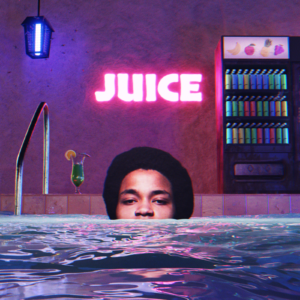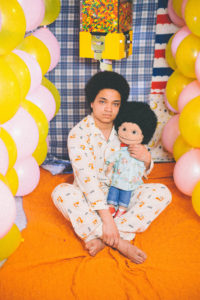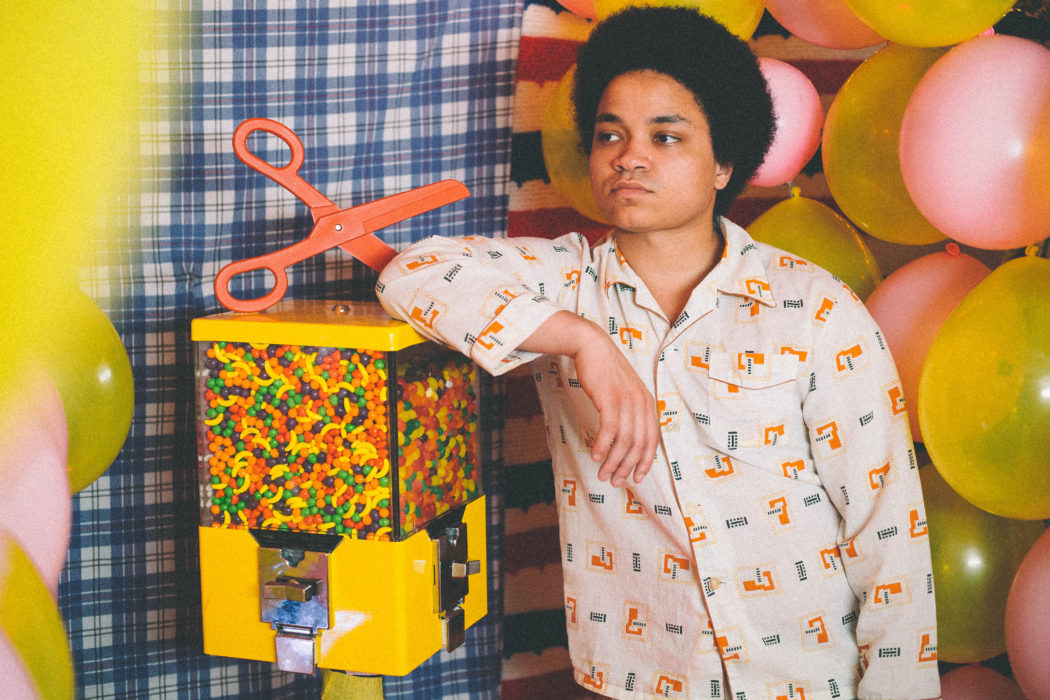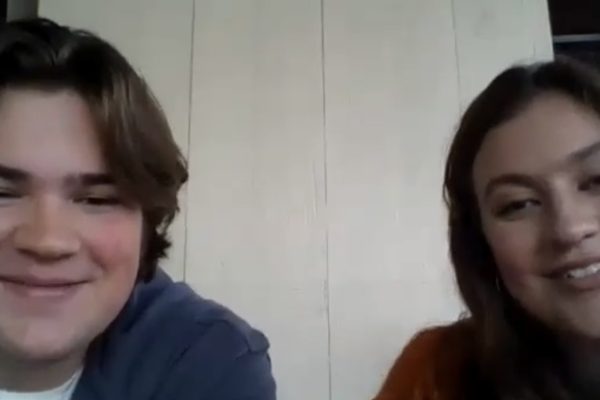If you’re trying to figure out the kind of artist that Tri-Cities rapper Karma Knows is, one thing to note is that his favorite movie is The Matrix. Another thing to note is that alongside growing up loving The Matrix, he also grew up on Fresh Prince; an experience that he describes as a “clusterfuck” but nonetheless extremely fitting with the vibrancy of his music.
When I hop on the phone with him, it’s the eve before his second EP, Juice, is about to drop. The “second installment of a conceptual trilogy,” this 6-track project shows Karma exploring a range of emotions and thoughts through some of the hypest moments and most unshielded moments.
His first EP, Sugar, was a look into love and comfortability. “I’m trying to grow past that and not get stuck in comfortability, you know? Being too comfy…” he starts. “That’s really what Sugar represented.” Now in Seattle, Karma says he finds himself getting out of that mindset he had growing up which is represented in Juice. As the second of his planned three, Juice documents Karma’s transitioning period while the future third EP will find himself fully out of that place–something he’s looking to come naturally as opposed to forcing it.
 In this EP, we hear Karma being more vulnerable in his music. One song that he highlights is his song “Run” where he dives deeper into dealing with depression. “I have a song called ‘Run’ where I was just really feeling in the ground a year ago after I broke up with my girl that I was with for like six years. That was the first girl I ever truly fell in love with so I just really wanted to put that feeling out that I had and I never really done that, you know? I’ve never gotten that deep I feel like.” He explains that song, in particular, is addressing a few things especially the feeling he was going through and letting the negativity get to him.
In this EP, we hear Karma being more vulnerable in his music. One song that he highlights is his song “Run” where he dives deeper into dealing with depression. “I have a song called ‘Run’ where I was just really feeling in the ground a year ago after I broke up with my girl that I was with for like six years. That was the first girl I ever truly fell in love with so I just really wanted to put that feeling out that I had and I never really done that, you know? I’ve never gotten that deep I feel like.” He explains that song, in particular, is addressing a few things especially the feeling he was going through and letting the negativity get to him.
The other song he cites is one called “Die Young” which was created out of a conversation with a friend discussing abuse. “That really blew my mind when I wrote that because it just came out of nowhere,” he explains, “I just remembered the story and I just wrote it in like 20 minutes and really kinda just made me vulnerable.”
I’m trying to grow past that and not get stuck in comfortability, you know?
Besides being in a different headspace, Juice and Sugar also differ production-wise. With this new project, Karma collaborated with different producers and developed a team which is an expansion from his first EP. “[Sugar] was kinda me and my mom’s basement on a computer just making music with my homie down the street and this one has been a little more professional in the making and that I’m really excited about too. Besides that, the whole process is really just the same when it comes to writing the songs and recording and stuff like that.”
The EP kicks off with the titular track, “Juice,” which is accurately described by Karma as a “hella fun song” that he says was the easiest to write due to how hype it is. The hardest one he determines is either “Church” or “Run” before concluding “Run.” “Probably because I really wanted to tap into that emotion too so when I wrote and recorded [“Run”], I kinda got myself sad again,” Karma admits.
His final song on Juice, fittingly titled “Church,” adds an extra dynamic to the EP while showing his willingness to take risks. “It just kind of happened that way because I was going through the songs and trying different orders, it made sense because EPs are supposed to be more positive and be me in a more solid area where I’m not depressed–I’m just on my grind and I’m focused,” he explains about the song’s placement on the project.
Incorporating gospel elements with the use of an organ as a significant player in the instrumental, the song gives a look into Karma’s upbringing in more ways than one including his experience being adopted. When I ask him if gospel music was significant in his home life, he says yes. “Yeah, 100% because my mom is actually a priest and it’s like a really big part of me. I feel like that’s why it was important to have it either be an intro or the end,” Karma shares, “and it just felt perfect in the end.”
“It’s funny cause my mom tried to get me to do [choir] but I was always embarrassed to sing in front of people, but I would always sing when I was alone. So I never stayed in it,” he admits. By his account, Karma was in gospel choir for a few weeks before his mom let him leave remarking that he preferred to sing when no one was home instead.
Eventually, you start not to care, you just gotta be yourself and go where your gut tells you.
Besides gospel music, Karma’s musical upbringing included multiple genres which all in one way or another influences him. “I love versatility,” he says. “I think honestly since I grew up on so many different types of music, I would hate to stick with one sound, it would kill me. Like, I know a lot of people kinda want you to stick to one sound it seems like, but I just don’t think I ever can.” He lists listening to rock, rap, R&B, and (unwillingly) country for his inability to make his music sound like only one thing. “I have so many different genres in my subconscious and I just love to explore that in different ways.”
“They really taught me to sit back and learn to not hate on things I maybe don’t want to listen to or things that may not be my cup of tea, you know? Just listening to it with more of an open mind and try to understand why the people that do like that type of music, like that type of music,” he continues further. “I think listening to all those different genres taught me that really respecting all music like I’m not gonna hate on country, I’m not gonna hate on rock, you know? And I’m down to listen to it, so I think that’s really the biggest lesson.”
When we talk a little more about how he developed an interest in rap and performing, he gives credit to Eminem, Tech N9ne, and Paul Wall. “When I first saw 8 Mile, I watched it two times in a row and would try to memorize the rap scenes which made me want to write my own,” Karma explains. “A year after that, I went to my first show with Tech N9ne and Paul Wall which fueled my love for concerts.”
His love for hip hop led to him studying as much as he could about it which proved tricky growing up in an area where the scene wasn’t focused on that genre of music. Karma admits to struggling with his adoption and how that impacted his identity and the culture around him when he was younger. Along with being biracial, he described the experience as feeling “segregated by cultures” when we chat about our different experiences with culture shifts. “Eventually, you start to not care, you just gotta be yourself and go where your gut tells you,” he concludes.
That ability to listen to his gut feeling and look to it for guidance is one of the most important things he developed growing up not feeling seen in the ways that he needed. “My gut always led me to like Black culture and a lot of hip hop. For about five years straight, I was constantly having to hear in my head just constantly listening to hip hop, old school, new school, R&B, all that. [My gut] would always pull me towards that so I would always mostly have Black friends.” He clarifies that given the nature of growing up in a predominantly white area and being surrounded by white culture, he didn’t distance himself from the primary culture and people around him, but he did veer away. “I always mainly gravitated towards Black culture more than anything.”
“People would always tell me, ‘Oh, you’re adopted, you gotta be more like your parents’ and I was like no, I’m just gonna go where my gut tells me.” Music was always an influencing factor for him and opening doors towards self-expression. “I feel like it helped more than anything, besides my parents. I used to be kind of embarrassed about being adopted, you know? It caused all kinds of problems on both sides of the fence. Music really helped me learn that all the people that I loved and look up to, they were unique and they were proud to be who they are.”
 The artists he looked up to helped him realize the uniqueness of his story that he could bring to his work, but he also realized there weren’t many stories and artists publicly discussing adoption. “I was still like embarrassed about that back in the day, but now I know that I gotta represent and I gotta put on for all the foster kids out there and all the kids that have been adopted looking for their identity, trying to figure out who they are and connect to their culture because I was so far from that when I was adopted. I didn’t know how to act or to be like or any of that, so music just helped me stop caring. Now, I can just be myself,” he reflects.
The artists he looked up to helped him realize the uniqueness of his story that he could bring to his work, but he also realized there weren’t many stories and artists publicly discussing adoption. “I was still like embarrassed about that back in the day, but now I know that I gotta represent and I gotta put on for all the foster kids out there and all the kids that have been adopted looking for their identity, trying to figure out who they are and connect to their culture because I was so far from that when I was adopted. I didn’t know how to act or to be like or any of that, so music just helped me stop caring. Now, I can just be myself,” he reflects.
Looking back now, Karma is open with his past and the ways in which he rebelled or found outlets for what he was going through. The more spirituality piqued his interest, the more he started to study the principles of karma and found his stage name while diving deeper into putting his energy towards music.
Music really helped me learn that all the people that I loved and look up to, they were unique and they were proud to be who they are.
“In the past, before I was really into karma and any type of spirituality when I look back now, I realize I was going through so much little karma and getting in trouble, going to jail sometimes or getting into it with the cops or at school or this and that and it was always just because of that energy I was giving out,” he admits. Not too later on when asked, Karma describes past him as being super stubborn and very pessimistic. While he acknowledges that he can still get that way at times, he’ll check himself or others will check him.
“I was always hating on things, I was always pissed off, I was always wanting to fight, you know? So looking back, now I really see how it affected me. Now, it’s different because just fucking up or just my flaws or figuring out how to get better at fixing them or healing them, I can really see where they’re hurting me. I can see like, ‘Oh, okay I drank too much or when I smoke too much I’m not as social and I don’t go out as much and connect with all my friends and go to shows and support other artists like I used to or it hurts as much when I’m smoking all day constantly,” he trails off.
When he looks back on who he was in the beginning versus where he is now and what he would tell himself, he laughs as he says, “Honestly, stop like fucking around and just stay focused, you know?” He furthers it by demanding, “You wanna do this music shit then take it seriously and don’t stop.”
As much as Karma will discuss and be open about the negativity in his life and the things he’s struggled with, you can’t help but be drawn by his ability to bring color into the work. Which isn’t new when it comes to hip hops history and aesthetic, but it still adds an extra layer to his projects be it a visual being very colorful or lacking colors. “I just always loved bright colors,” he starts also citing OutKast and earlier Kanye as big influences. “My parents would never let me wear Hawaiian clothes all the time as a kid so when I was an adult, I would just always wear Hawaiian stuff. It just made me feel good when I’m walking around and people smile more when they see me.”
He also gives credit to his director Justin Frick for helping with the vision and branding before continuing. “I just always loved bright colors and bright clothes and cartoons. That’s always attracted me so I really wanted to implement that into my brand and my music.”
~~~
Karma Knows Mini-Playlist for Readers:
~~~
You can stay up to date on all things Karma Knows by following his Twitter, Facebook, and Instagram accounts.
Juice EP is available wherever you stream music.
(photo cred: Justin Frick)




